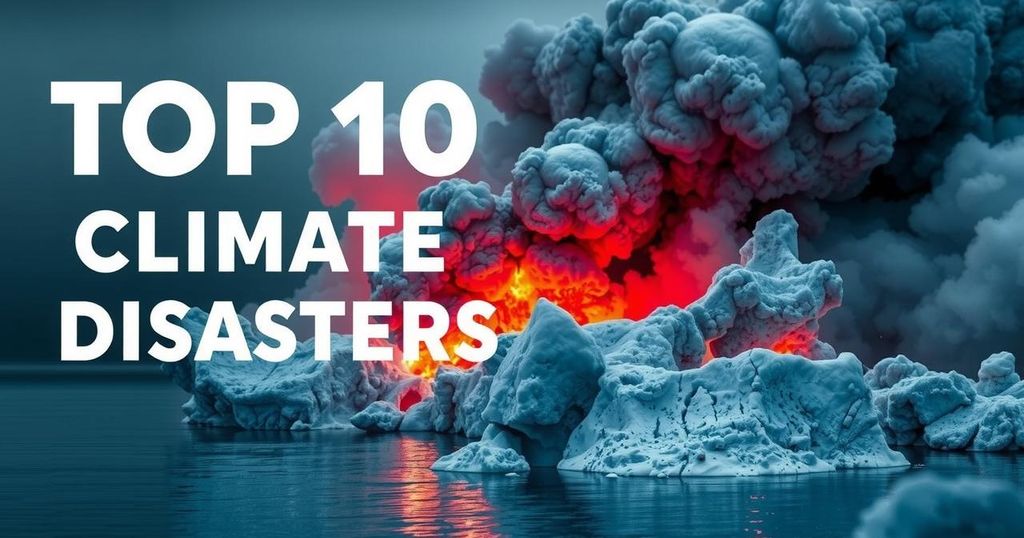World news
AFRICA, ASIA, BANGLADESH, BRAZIL, CHINA, CHRISTIAN AID, CLIMATE, CLIMATE CHANGE, EUROPE, GLOBAL WARMING, HELENE, IMPERIAL COLLEGE LONDON, LATIN AMERICA, MARIA, MARIAM ZACHARIAH, MEXICO, MILTON, NATURAL DISASTERS, NORTH AMERICA, PATRICK WATT, SOUTH AMERICA, SOUTHEAST ASIA, SPAIN, U. S, US, VALENCIA
Amira Khan
0 Comments
The Economic and Human Toll of Climate Disasters in 2024: A Global Perspective
In 2024, climate disasters resulted in $229 billion in damages and around 2,000 deaths worldwide, with Hurricane Helene and Milton causing record losses predominantly in the U.S. Extreme weather events linked to climate change emphasized the urgent need for global cooperation and commitment to mitigate impacts, particularly for vulnerable communities that face the greatest risks.
The year 2024 has been characterized by alarming climate disasters, resulting in an astounding $229 billion in economic damages and approximately 2,000 lives lost. Among these catastrophes, Hurricanes Helene and Milton led to unprecedented financial repercussions, inflicting losses exceeding $75 billion each, primarily affecting the United States, which accounted for 75% of the total financial impact. Meanwhile, global events such as Typhoon Yagi and various floods across Asia and South America underscored the worldwide implications of climate change.
For the first time since records commenced in 2018, two hurricanes have each surpassed $50 billion in losses within a single year. Helene and Milton, which struck the United States in September and October, emerged as the most costly disasters of 2024, signifying a disturbing trend where climate change intensifies severe weather conditions. Overall, the ten worst climate disasters of the year have each resulted in damages exceeding $4 billion, with events ranging from flooding in China and Brazil to Typhoon Yagi in Southeast Asia.
In addition to the staggering economic toll, the human cost of these climate disasters is profoundly troubling. Typhoon Yagi stands out as the deadliest incident, claiming at least 829 lives while storm Boris in Europe resulted in 26 fatalities and $5 billion in damages. Additional incidents, including floods in Brazil and Valencia, contributed to the growing list of casualties and destruction. Furthermore, less dramatic events such as droughts in Africa and heatwaves in Bangladesh have inflicted serious harm, affecting food security, heightening health risks, and undermining the stability of vulnerable communities.
Scientists attribute these extreme weather occurrences to anthropogenic climate change, emphasizing that “Most of these disasters bear the clear imprint of climate change” – Dr. Mariam Zachariah, Imperial College London. The intensification of storms, droughts, and heatwaves can be linked to the continued burning of fossil fuels, which further exacerbates and elevates the severity of these phenomena. Christian Aid, which conducted the analysis, warns that the figures reported underestimate the real consequences, particularly in poorer countries where many individuals lack insurance.
Patrick Watt, the CEO of Christian Aid, advocates for immediate global action, asserting, “Human suffering caused by climate change reflects political decisions.” His remarks point to a significant gap in commitment to reduce emissions and financially support vulnerable regions that bear the brunt of climate change despite contributing minimally to overall emissions. He emphasizes the importance of fulfilling financial pledges aimed at adaptation and mitigation efforts.
The events of 2024 highlight an urgent need to strengthen efforts against climate change. While high-income nations like the United States face vulnerability to severe weather, developing countries suffer the most dire consequences, often with inadequate resources for recovery. The present trajectory, characterized by increasing frequency and intensity of climate-related disasters, necessitates prompt action. Solutions such as reducing reliance on fossil fuels and bolstering resilient infrastructure are critical and achievable, provided there is political commitment and international collaboration.
The analysis for 2024 serves as a stark reminder of the urgent human and economic costs of climate change. Each disaster illustrates how contemporary choices shape future outcomes, presenting both a challenge and an opportunity. Investing in climate resilience and prioritizing emission reduction are vital strategies to avert potential crises and safeguard lives and livelihoods. As we confront the challenges laid bare by this year’s climate disasters, 2025 must herald a renewed global commitment to addressing climate change effectively.
The increasing frequency and severity of climate disasters are significantly affecting global economies and communities, particularly in light of human-induced climate change. The analysis of climate disasters for 2024 reveals the extensive economic losses and the dire human toll resulting from extreme weather phenomena such as hurricanes, typhoons, and floods. By assessing the underlying causes and engaging with key stakeholders, we can better understand the necessary adjustments required to mitigate climate change impacts and foster resilience globally.
In summary, the climate disasters of 2024 underscore the profound human and economic impacts stemming from climate change, as evidenced by significant losses and tragic fatalities. The analysis highlights the need for urgent global action to reduce emissions and provide support to the most vulnerable populations. With the increasing intensity of climate events, it is imperative that nations enhance their commitments to adapt to and mitigate climate effects, paving the way toward a more resilient future. The correlation between political decisions and the human suffering caused by climate change must galvanize leaders to prioritize actionable solutions.
Original Source: www.drivingeco.com




Post Comment